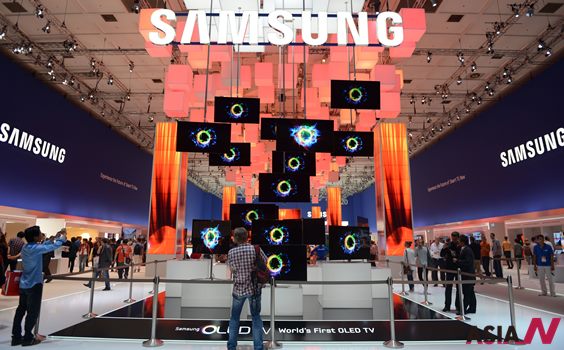SAMSUNG dominates Pakistan’s consumer electronics market
As I received report about the demise of SAMSUNG chief Lee Kun-hee a few days back, I recalled my visit to SAMSUNG Town in Seoul during South Korean tour on the invitation of Asia Journalists Association in 2007. Name of this company was familiar to me but I had no idea of it being such a huge venture until I visited the SAMSUNG Town spread over a vast area with high-rise buildings meant for display center, offices and innovative work. It was informed that 7000 employees used to work there that had been provided accommodation also. The SAMSUNG had arranged lunch for the AJA delegates in a multi-story building, where a high official of company informed that 7000 employees take lunch at that building during lunch break.
When I wrote a book about my travel to South Korea, I allocated a separate chapter on SAMSUNG, mentioning all the details of company including the big screen LCD TVs and refrigerators put at the display center, but now when I searched profile of this company, I was taken aback that SAMSUNG is conglomeration of 80 companies and subsidiaries engaged in manufacturing of LED TVs, home appliances, refrigerators, medical devices, printers, cameras, semiconductors and several other products and even the ships are built by it.
It made me to realize that a voluminous thesis is required to research and write on history and success stories of SAMSUNG established in 1938 as a trading company. Over the next three decades the group diversified into areas including food processing, textiles, insurance, securities and retail. Samsung entered the electronic industry in the late 1960s and the construction and shipbuilding industries in the mid-1970s; Following the death of Lee Byung-chul, its pioneer, in 1987, Samsung was separated into four business groups – Samsung Group, Shinsegae Group, CJ Group and Hansol Group. Since the 1990s Samsung has increasingly globalized its activities, and electronics, particularly mobile phones and semiconductors, have become its most important source of income.
Notable Samsung industrial subsidiaries include Samsung Electronics (the world’s largest information technology company, measured by 2012 revenues, and 4th in market value), Samsung Heavy Industries (the world’s 2nd-largest shipbuilder measured by 2010 revenues), and Samsung Engineering and Samsung C&T (respectively the world’s 13th and 36th-largest construction companies). Other notable subsidiaries include Samsung Life Insurance (the world’s 14th-largest life insurance company), Samsung Everland (operator of Everland Resort, the oldest theme park in South Korea), Samsung Techwin (an aerospace, surveillance and defense company) and Cheil Worldwide (the world’s 15th-largest advertising agency measured by 2012 revenues).
The SAMSUNG is not confined to South Korea, as it has a number of manufacturing plants in different countries like China, Poland and Vietnam besides joint ventures in some countries.
Another role played by SAMSUNG that keeps it at distinct position, is fulfilling social responsibilities by sponsoring sports events.
In Pakistan too, the SAMSUNG is known as leading consumer electronics producer. Recently, the company had announced increasing the market share in Pakistan’s consumer electronics up to 50 percent, which currently is 38 percent. The market reports suggest that rise of middle class in Pakistan has boosted the consumer electronic appliances’ sale in the country and the global economic downturn has forced other producers to reduce their operations here leaving the market wide open in Pakistan for SAMSUNG to capture.
The SAMSUNG or the Tri-Star, as it means in Korean language, is really a shining star. As per SAMSUNG profile the word “three” represents something “big, numerous and powerful”; the “stars” mean eternity. The SAMSUNG has continued its journey of progress for 76 years and hopefully would be contributing a lot to the economies of Korea and other countries around the world.




























































